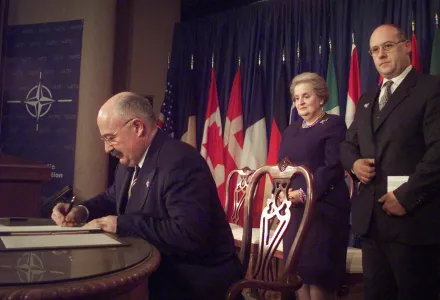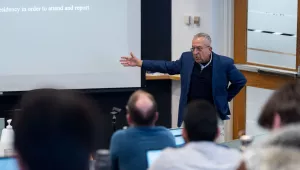
It's not just that the United States has made mistakes—the very idea of U.S. global leadership is broken from the ground up.
Can we talk about something else for a moment?
Although it is nearly impossible to wrest one's mind away from COVID-19 and its implications, I'm going to give it a shot this week. I want to explore a topic that my students and I were discussing a few days ago, in a class on realist and liberal conceptions of world order. The question was whether the U.S. attempt to create a liberal world order during the brief "unipolar moment" was doomed from the start.
To be more specific: are the criticisms that I (and others) have leveled at the U.S. strategy of "liberal hegemony" really fair? Is it possible that creating a global order based on liberal values (i.e., democracy, free markets, the rule of law, individual rights, etc.) was more feasible than it now appears? Might this strategy have succeeded if U.S. leaders had been a little smarter, less arrogant, a lot more patient, and a bit luckier? Was liberal hegemony really "bound to fail," as John Mearsheimer suggested last spring, or were there plausible courses of action that would have led to the steady expansion and deep embedding of liberal values and institutions around the world? In the unlikely event that the United States found itself in a similar position of primacy again, could it learn from its past mistakes and do better the second time around?
That the first attempt was a costly failure should be beyond dispute. Instead of advancing, democracy has been in retreat around the world for more than a decade—including in the United States itself—and U.S.-led efforts at regime change have led not to thriving democracies but to failed states and costly occupations. Hyperglobalization under U.S. auspices produced a grave financial crisis in 2008, politically painful job displacement in a number of sectors, and helped trigger a wide-ranging populist backlash. NATO enlargement helped poison relations with Russia, and policies such as dual containment in the Persian Gulf inspired anti-U.S. terrorism, including the 9/11 attacks and all the negative consequences that flowed from that event. The end result of these developments has been a partial retreat from globalization, the emergence of would-be autocrats in Hungary, Poland, and even in the United States, and revitalized authoritarianism in many other places....
Walt, Stephen. “There's No Such Thing as Good Liberal Hegemony.” Foreign Policy, April 21, 2020





